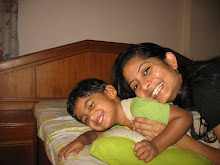Review of The Other Hand by Chris Cleave
An edited version of this review appeared in The Sunday Express.
If Houdini ever made a film about Big Brother, then how would it be? Would it be magical? Would it be a reality show? Improbable as the situation is, my guess it would be a bit of both. If it were really good, it would be like 'The Other Hand' by Chris Cleave. The high brow might call it Magical Realism, Rushdie might phrase it a development out of surrealism that expresses a genuinely Third World consciousness, but I would just say that 'The Other Hand' is all flesh and blood and callused and lined so intricately that it can only foretell an extraordinary life. And, of course, it also wields the wand.
'The Other Hand' is the story of two women who could not be farther removed from each other, racially, economically, demographically, and what have you, and how their lives come together in a dark twist of events. Little Bee is a teenaged Nigerian refugee in the United Kingdom who has seen humankind at its sordid worst, and Sarah is a high powered, white, career woman with a life that is as regular as the tea she drinks every morning. While Little Bee is running away from her country and its surreptitious barbarity, Sarah's issues are mostly moral in nature, not to mention extricating her four-year-old from his assumed Batman identity and costume. In an interplay of events, all jumbled up for intrigue, we see the seamless transformation of girl to woman, emptiness to meaning, superhero to child, darkness to light. Furthermore, the novel unfurls the glaring twin faces of a democracy, the elusiveness of freedom to a certain section, that surprisingly is also human; the reality of horror, which to most of the civilized world is a genre of cinema; the concept of suicide as a comfort blanket; moral ambiguity and its decisive consequences; and most remarkably, humour as a natural ally in the darkest of moments.
Besides the daunting task of assuming a female voice, Chris Cleave tells the story with two narratives to paint the dual worlds of the protagonists. While Little Bee's narrative weaves magic, albeit dark, Sarah's is more on solid ground and closer to the real world, if you'll pardon my civilized tongue. Little Bee's narrative is profound, sometimes unbelieveably so, coming from a third world teenager however intelligent. But the profundity is so beautifully profound, that it makes you read at the pace of a second grader. The magic in Little Bee's narrative is so bewitching, that I was tempted to skip Sarah's narrative. I mean, why would one choose to read about a life that is so soap opera, when exotica awaits you in the next chapter? This of course, is no fault of the writer, who astounds the reader with his astute writing, and some excruciatingly artistic metaphors, that made me physically close my eyes and visualise them.
The year of research Chris Cleave has done for his second novel has held him in good stead. In that he manages to portray quite accurately, even if it's for a largely unexposed audience, the variations in dialects in Jamaican, Nigerian and of course, British English, with their respective brands of humour. The dismal and deprecating conditions of the Immigration Detention Center whose roots are mottled with monetary motives, surface with suitable subtelty. The imperfect British democracy has been thrown light on, if not laid threadbare, but maybe there was no need to research that one.
You'll forgive the slight repetitiveness and teeniest bit of verbal superfluity for the brilliant ideas and the wonderful humour that show up in various forms throughout the book. You'll forgive the incongruity of the four-year-old who has a wonderfully developed imagination but the grammar of a two-year-old, for the depth and range of emotions the novel elicits. Yes, you'll also forgive the fly that sits on the page while you're reading, or most likely you just won't notice it.


0 Comments:
Post a Comment
<< Home